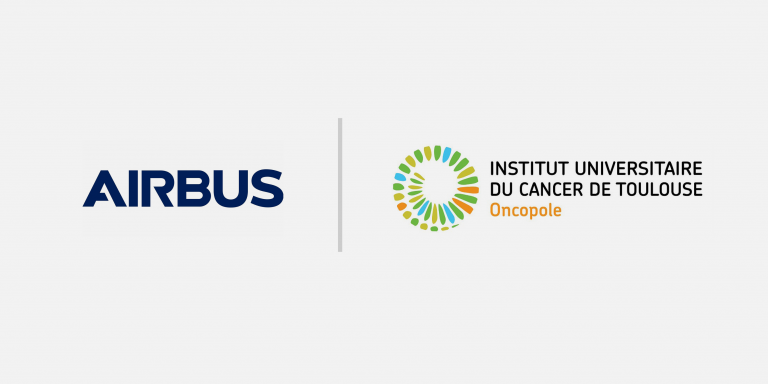
On March 3, the University Cancer Institute of Toulouse, IUCT-Oncopole, signed a memorandum of understanding with the aeronautics leader AIRBUS. The two parties will develop research projects of mutual interest over the next two years, particularly in the field of artificial intelligence and data analysis.
The IUCT-Oncopole is composed of the Claudius Regaud Institute, a cancer research center, and several teams from the Toulouse University Hospital. On the same site, the two establishments bring together the expertise of 1500 professionals specialized in cancer. The Institute is located at the heart of a campus bringing together private and public players involved in the fight against cancer. It has three missions: care, research and teaching.
Specialized in rare and complex pathologies, the IUCT-Oncopole welcomes all patients requiring treatment for the following pathologies: hematology, women’s cancers, ENT cancers, skin cancers (melanoma), certain sarcomas, urology (medical, innovative surgery).
The institute brings together all the cancer disciplines required to detect, treat and monitor the disease: surgery, medicine, radiotherapy and brachytherapy, nuclear medicine, interventional imaging, biology and anatomopathology, and offers patients a personalized care program, the result of consultation between various specialists. On the other hand, doctors and researchers work daily on innovative therapeutic programs.
Airbus
Everyone knows AIRBUS, a company based in Blagnac, on the outskirts of Toulouse, which employs about 135,000 people. It offers a very complete family of airliners (it manufactures more than half of the world’s airliners) but is also the European leader in the field of mission, air-to-air refueling, combat and transport aircraft. The company is also a leader in the space industry. In helicopters, Airbus offers some of the world’s most capable civil and military solutions.
Memorandum of Understanding on the use of AI
Artificial intelligence (AI) can be used to explore the health data accumulated in recent years and has enormous potential for the medicine of tomorrow, and more specifically for the detection and personalized treatment of certain cancers. The agreement aims to improve disease diagnosis and patient health monitoring through the use of artificial intelligence. Airbus engineers will bring their expertise to physicians to optimize diagnosis and monitoring of patients’ health. Marc Hamy, Airbus Corporate Affairs Director, said:
“Bringing together a world leader in aeronautics with a world-renowned center of expertise in medicine like Oncopole, to accelerate cancer research through artificial intelligence, that is the ambition of this new partnership we have just signed. Cancer treatment is a great cause that Airbus wants to support by contributing to the development of digital technologies, which are becoming increasingly important in medical research and treatment as well as in aeronautics. This cooperation around digital platforms for data processing, the latest technologies in terms of big data, cloud and artificial intelligence, should therefore allow both parties to enrich each other’s know-how and advance innovation in each sector. We therefore expect to learn from Oncopole while helping it to push its research and advanced treatments even further in the fight against cancer, which remains a major challenge for medicine in France as well as internationally.”
Airbus has developed capabilities to monitor the status of aircraft fleets, but also to extract information from images that could potentially be of interest to the IUCT-Oncopole. The IUCT-Oncopole manages a large amount of patient data on a daily basis. To strengthen their security and expertise, the two players intend to pool their know-how in artificial intelligence in order to develop a trusted, responsible, safe and explainable AI. Prof. Jean-Pierre Delord, Director General of the ICR and Administrator of the IUCT-Oncopole states:
“By pooling our expertise with that of aeronautics we hope to accelerate the development of increasingly personalized medical innovations. Healthcare is also a field where AI has been used for many years and some of the technologies developed for medical applications could enrich the capabilities currently used for aerospace.”
AI is now opening up new therapeutic prospects for preventing and curing cancers in an increasingly personalized way, such as the cancer vaccine, for which a clinical trial has been underway at the IUCT-Oncopole for over a year.
Artificial intelligence should also make it possible to model the follow-up of patients at home, gain precision in radiotherapy, and improve diagnosis through medical imaging or the characterization of tumors on slides. Professor Delord concludes:
“All these advances are possible thanks to the public/private collaborations we have been able to develop over the past several years, and we are delighted to continue this shift in artificial intelligence with the world leader in aeronautics.”
Translated from Airbus et l’IUCT-Oncopole partenaires pour lutter contre le cancer grâce à l’Intelligence Artificielle









